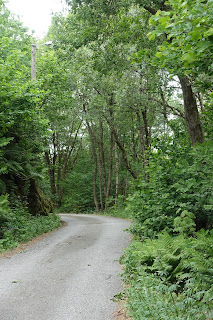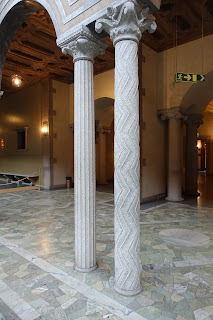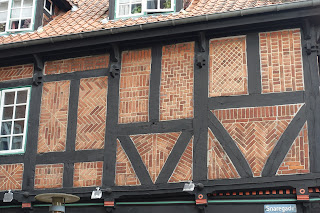 |
We arrived in Copenhagen, Denmark, early, with the day ahead of us unscheduled, after traveling and sleep deprivation. Our tour guide, Amanda, recommended that we walk along the water's edge to the Nyhavn (New Harbor, 1671) canal, a popular area in the old
section of the city. She said, "Nyhavn is fun to visit and a view you will see on every Denmark brochure." This turned out to be a perfect beginning to our trip.
I couldn't resist this messenger, relaxing and waiting for his next call -- just flip down the kick stand and sit on the package rack in the sun with your phone.
As we walked along canals and wandered various streets, the King's
Garden at Rosenborg Castle drew me in. I left Bill sitting on a bench, passed people relaxing on the grounds, crossed the moat, and, sure enough, found lush rose gardens. Rosenborg was the country summerhouse of King Christian IV, built in 1606.
Walking along the Inner Harbor, we learned that, previously, the water here had been polluted from centuries of industry and commerce. Now, with the warehouses turned into expensive apartments and condos, and the river clean, people walk, ride their bikes, sunbathe, and even slide down into the water on this series of boardwalks.
What a juxtaposition of the "Black Diamond," an extension of the Royal Library, next to the old Brewery
.
And how about the new opera house? It would be exciting to hear a concert here!


Not far from Copenhagen, charm outdid itself in this village of whitewashed cottages and rose-covered picket fences. I walked so far taking pictures of cute houses, that I had only moments to get my feet wet in the bay. Although I was in a stony jetty area, white sand beaches abound on the Danish Riviera.
I'm sharing the chapel of Frederiksborg, Frederik IV's hunting home, with you because its massive pipe organ built in 1610 with 1001 wooden pipes must be a marvel to hear live. Even the recorded sound of the organ, playing 17th-century music that filled the chapel during our visit, was moving.
This cute building with its public post box on the side and roses up the front is in Odense, the town where Hans Christian Andersen spent his childhood. Odense is actually a large city of 178,000, but it has an extensive neighborhood of 17th century buildings and Medieval churches.
Don't you love the kaleidoscope of brick designs on this building in Randers, another town peppered with streets from the early 1600s? I was taken with the fact that so many of the very old buildings in Randers are being used much as they had been over the centuries -- storefronts and shops at street level and apartments above.
We left Denmark and headed into Norway, where we visited Trolhaugen, composer Edvard Grieg's home. I thought you would agree with me (and Edvard, of course!) that local carving adds beauty to home decor.

Grieg's studio is a jewel. A tiny building facing the bay, the studio could certainly offer creative inspiration. With the desk in front of the window, a small piano along one wall, and a day bed along the other, couldn't you or I accomplish great things in a place like this?
The Bryggen area in Bergen, built in the 1300s as a dock for loading and processing fish, evolved into this jumble of warehouse construction in 1710. It now houses shops, galleries, and restaurants. Amanda said that this was a good place to shop for quality, although sometimes pricey, items. I admit to buying a Norwegian sweater in a small tucked-away store.
 It seems that everywhere in Europe, World War II is not far away. This tiny fishing village of Telavag, a hub of resistance to Nazi occupation, was totally destroyed in 1943 when the Gestapo discovered it. Telavag's women and children were sent to a confinement center, and its men taken by ship to a concentration camp in Germany. Amanda took us down the road that the men walked to the town harbor for their voyage to unknown horrors. Imagining the scene gives me chills even while writing this paragraph now.
It seems that everywhere in Europe, World War II is not far away. This tiny fishing village of Telavag, a hub of resistance to Nazi occupation, was totally destroyed in 1943 when the Gestapo discovered it. Telavag's women and children were sent to a confinement center, and its men taken by ship to a concentration camp in Germany. Amanda took us down the road that the men walked to the town harbor for their voyage to unknown horrors. Imagining the scene gives me chills even while writing this paragraph now. Exposure to a variety of cultural opportunities is one of the many parts of our tours that we love. We visited a small farm where we feasted on a smorgasbord of foods made and prepared on the property.
The farm has horses for work and play. Take a look at the dun-colored horse on the the left. This is a Norwegian fjord horse and has a distinctive skunk-like black stripe through its blonde mane, bangs, and tail!
Speaking of fjords, I am showing great self-restraint by including just a few photos of the stunning drama that Norway presents.

These glacier-formed mountains and cliffs often stand a mile above the water and reach a mile deep into the water.

Sometimes a rainy day just adds to the magnificence.

That fjord farmers eked out a living on the edge
of the cliffs seems unbelievable. In fact, they grew quite a bit of fruit, even apricots. We learned that summer days of nearly 24-hour light give Norwegian fruit an intense flavor and sweetness.
For my readers who have never gone on a coach tour, don't believe people who say that buses can't go to out-of-the-way places. Our driver negotiated many many twisty tiny routes, such as Dalsnibba's wintry road, that appears to drop out of sight.


And another down through Trollstigen Pass. Amanda rewarded everyone (although not our driver who deserved it most!) with a taste of Aquavit, a regional 80 proof distillation of grain and potatoes. Bill declared it very tasty.
The Village of Lom is famous for its 12th-century stave church. On this Saturday, the church was not open to tourists because a wedding was taking place inside, so I took off for the hills. Many of you know that this is my wont. I found a collection of quaint Norwegian houses and barns at the edge of a farm field surrounded by wildflowers.
Fortunately, Amanda had a stop at the Ringabu Stavkirke in her pocket. This, too, had a wedding planned. When we arrived at the church, Amanda walked some distance to find out if the wedding was over so that we could tour the inside. As it turned out, the wedding had been canceled! Although we hoped this was not due to pre-marital strife, we felt fortunate to have the place to ourselves!
Stave churches were built by Vikings, who, by the time Christianity was prevalent in Norway, were farmers more than warriors. Being skeptical of the new religion, the builders included all the Christian symbols but also added a few carvings of their own gods and dragons. The "staves" are the tall load-bearing pine columns in this construction. Even though there were once over 1200 of these wooden churches in Norway, the fact that 32 have survived from the 1100s is astonishing.

Lillehammer is not only home to the 1994 Olympics, but also to the open-air museum village of Milhaugen. I couldn't get enough of the carvings on barns, houses, and any utility building.
Back in 1994, Bill and I were drawn to the televised Norwegian city scenes from Lillehammer. You may remember that these Olympic games were the site of the infamous figure skating battle between Tonya Harding and Nancy Kerrigan, as well as the more glorious moments of American speed skater Dan Jansen, and skiers Bonnie Blair, and Picabo Street.

In Oslo, we walked narrow streets and toured Vigeland Park and its more than 200 sculptures. We went to museums such as the Nobel Peace Center, and the Viking Museum where we saw original excavated Viking ships and sleds. At the Fram Polar Ship Museum, we learned about early voyages to the north and south poles.
And, look at this -- Bill caught dinner while in the polar regions!!
In Stockholm, where our tour ended, we visited its City Hall, and the captivating Vasa Ship Museum.
And we took our last of many boats rides past man-made and natural beauty.


To finish off our journey to Denmark, Norway, and Sweden, we donned heavy coats and hoods, had a drink in a glass made of ice, sat on a chair made of ice, and were grateful for our Scandinavian experience.























